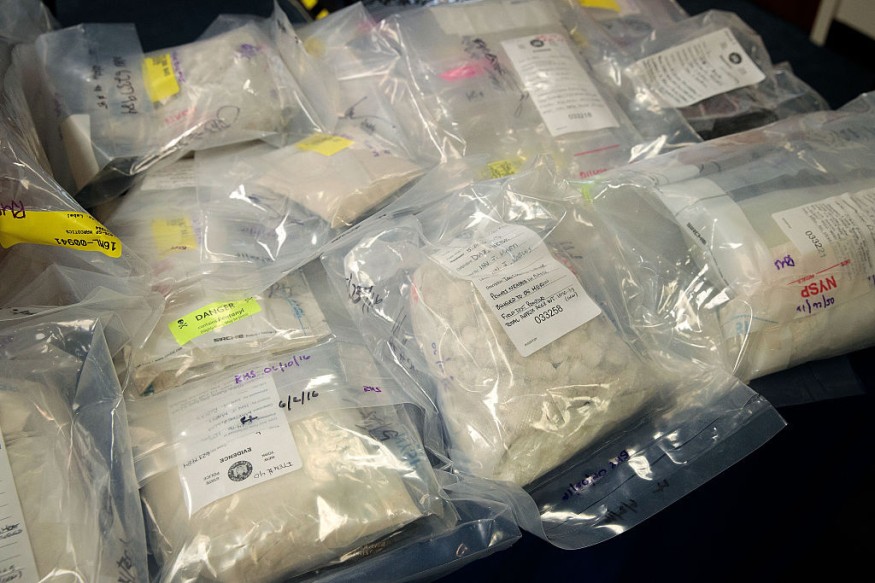El Chapo's Sinaloa Cartel Continues to Thrive Despite the Drug Lord's Absence: Report

The business of Sinaloa Cartel continues to thrive despite the arrest of its boss, Joaquin "El Chapo" Guzman, according to a report citing official U.S. data, security analysts, and some of his own lawyers.
According to Business Insider, official figures showed that the influx of drugs into the U.S. and the violence in Mexico continued to worsen even after El Chapo's arrest.
El Chapo is serving a life sentence in prison after being found guilty of all 10 federal charges he faced. The Sinaloa Cartel boss is currently being held in a U.S. "supermax" prison since 2017.
U.S. authorities, at the time of his arrest, said that El Chapo's apprehension was a significant victory and milestone when it comes to their efforts against drug trafficking and violence.
Influx of Drugs in the U.S. Despite El Chapo's Arrest
When El Chapo was behind bars in Mexico in 2016, a total of more than 5,000 pounds of cocaine were busted at the border in that fiscal year.
When the Sinaloa Cartel boss was extradited to the U.S. the following year, it further increased to over 9,000 pounds, data from U.S. Customs and Border Protection (CBP) showed.
Cocaine seizures in the U.S. totaled 58,006 pounds last year, and as of April this year, 62,324 pounds were confiscated. Meth seizures in the U.S. numbered 117,600 pounds in 2020, a big jump to 29,000 pounds of meth recovered in 2015, while El Chapo was still on the loose.
According to a Drug Abuse website, the Drug Enforcement Administration (DEA) focuses on trafficking from Mexican drug cartels since they do not only control a large share of the drug smuggling into the U.S., but they are also responsible for much of the drug distribution in the country.
Some law enforcement officials believed that Mexican drug cartels are seizing the opportunity of the current situation at the U.S.-Mexico border.
U.S. Border Patrol agent Joel Freeland said they are seeing Mexican drug cartels exploiting the current influx of unaccompanied children and single adults, who are bringing hard drugs, CBS News reported.
Freeland said that human smuggling is enabling traffickers to move a huge number of drugs, including 59 pounds of fentanyl that were confiscated by Texas law enforcement in the past six months.
Fentanyl seizures have peaked 800 percent in Texas in a year, and the drugs are causing an unparalleled epidemic in the U.S.
The Arrest of Leaders of Sinaloa Cartel and Other Mexican Drug Cartels
A senior analyst in Mexico for the International Crisis Group, Falko Ernst, said that seeing the arrest or killing of cartel leaders like El Chapo as a way to destroy the cartels is misleading and leads to bad policies.
Ernst noted that El Chapo's arrest is an illusion if one believes that you can behead a criminal group and dismantle its operations with his apprehension, Business Insider reported. The senior analyst added that the Sinaloa Cartel boss' arrest did not solve anything.
Meanwhile, one of El Chapo's lawyers in the U.S., Michael Schneider, told Insider that the Sinaloa Cartel boss' case was very much linked to politics. The lawyer noted that "it was basically all politics."
The Sinaloa cartel is one of the most powerful drug trafficking groups in the world. According to Britannica, the Mexican drug cartel was involved in the 1985 torture and murder of a U.S. drug enforcement in 1985.
Recently, El Chapo's wife, Emma Coronel Aispuro, pleaded guilty to a range of charges, including conspiracy to distribute illegal drugs.
BBC News reported that she could face life in prison and be fined up to $10 million. Jeffrey Lichtman, the lawyer of Emma Coronel Aispuro who struck a plea deal with federal prosecutors, said that she's happy to put this behind her.
READ MORE: El Chapo's Wife Emma Coronel Aispuro to Plead Guilty to Helping Him Run Notorious Sinaloa Cartel
WATCH: Mexico's Cartels Are Deadlier Than Ever Despite the Pandemic - From Vice News
Subscribe to Latin Post!
Sign up for our free newsletter for the Latest coverage!
© 2026 Latin Post. All rights reserved. Do not reproduce without permission.















